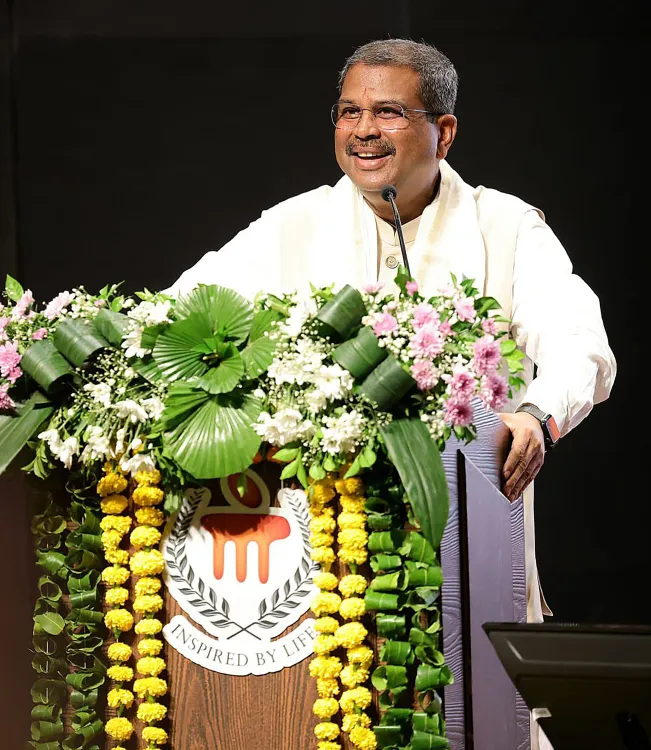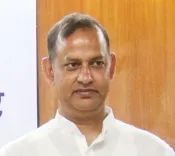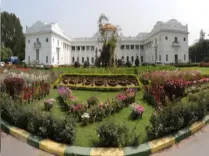Are Foreign Varsities Establishing Campuses in India?

Synopsis
Key Takeaways
- Importance of Lifelong Learning: Education is a continuous journey.
- NEP 2020: Advocates for skill-based and multidisciplinary education.
- Global Collaboration: Eight foreign universities have established campuses in India.
- Role of Graduates: Students are called to contribute to nation-building.
- Future Vision: Viksit Bharat by 2047 aims for a developed India.
Jaipur, June 19 (NationPress) The Union Minister for Education, Dharmendra Pradhan, visited Jaipur on Thursday to participate in two significant events: the 9th Convocation Ceremony of the Central University of Rajasthan and the opening of a new lecture hall complex at Manipal University in Jaipur.
As the Chief Guest at the convocation, Pradhan highlighted the importance of lifelong learning, asserting, “Convocation is not an end, but a vital milestone in the ongoing educational journey.”
He congratulated the 1,693 graduates from various programs, including Integrated M.Sc, B.Tech, B.Sc, and Diploma courses, reminding them that obtaining a degree is not just an academic achievement but also a responsibility towards nation-building and social accountability. He acknowledged the transformative vision of the National Education Policy (NEP) 2020, which promotes multidisciplinary, skill-oriented, and job-focused education.
Pradhan announced that numerous foreign universities are establishing campuses in India to enhance global academic collaboration, with eight institutions already operational.
Praising Rajasthan’s rich educational legacy and its strong performance in competitive exams such as JEE and NEET, he referred to the state as a “timeless cradle of knowledge, science, art, literature, and thought.”
He urged students to uphold this legacy while embracing a modern, innovative spirit. With India becoming the world’s fourth-largest economy, the minister emphasized the need to harness the creativity, skills, and leadership potential of the youth to achieve the vision of Viksit Bharat by 2047.
Concluding his address, Pradhan invoked the ancient Indian principle of Vasudhaiva Kutumbakam—“the world is one family”—and reaffirmed India’s dedication to becoming a global provider of solutions for humanity.
The convocation also featured the inauguration of various university infrastructure projects and the laying of foundation stones for future developments.
Attendees included Bhagirath Choudhary, Minister of State for Agriculture and Farmers Welfare, Prof. Anand Bhalerao, Vice Chancellor of the Central University of Rajasthan, along with other dignitaries, faculty, and students.
In a separate event on the same day, Pradhan inaugurated a state-of-the-art lecture hall complex at Manipal University Jaipur.
He commended the new facility, calling it world-class and conducive to a modern learning environment, and congratulated the university’s academic community for this achievement.
The minister praised Manipal University for successfully merging India’s rich cultural heritage with contemporary educational values.
Referring back to NEP 2020, he highlighted that India’s ancient knowledge systems are being effectively integrated into the current academic framework, instilling a sense of pride and rootedness among students.
Minister Pradhan labeled Rajasthan as a symbol of India’s glorious past, urging it to become a beacon of a developed and future-ready India.
He envisioned institutions like Manipal University evolving into hubs of research, innovation, and entrepreneurship, transforming students into job creators instead of job seekers.
Expressing confidence in the university's potential, he stated that Manipal University Jaipur is well-equipped to tackle both local and global challenges while contributing significantly to the Viksit Bharat 2047 vision.
Encouraging the university's leadership, Minister Pradhan suggested establishing a dedicated research park to further enhance its culture of innovation and entrepreneurship, reinforcing its ambition to become a leading research-driven institution.





